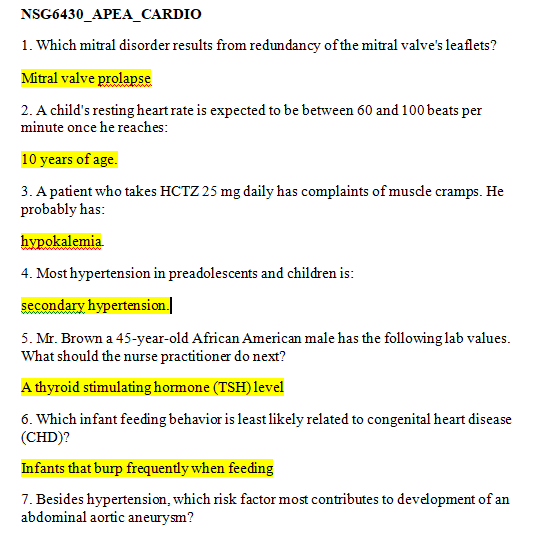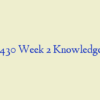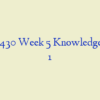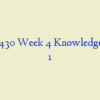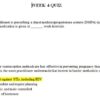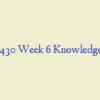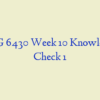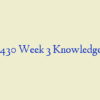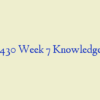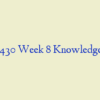Description
NSG 6430 APEA EXAM CARDIO – Question with Answers
- Which mitral disorder results from redundancy of the mitral valve’s leaflets?
- A child’s resting heart rate is expected to be between 60 and 100 beats per minute once he reaches:
- A patient who takes HCTZ 25 mg daily has complaints of muscle cramps. He probably has:
- Most hypertension in preadolescents and children is
- Brown a 45-year-old African American male has the following lab values. What should the nurse practitioner do next?
- Which infant feeding behavior is least likely related to congenital heart disease (CHD)?
- Besides hypertension, which risk factor most contributes to development of an abdominal aortic aneurysm?
- Which antibiotic should be used with caution if an older patient has cardiac conduction issues?
- The usual clinical course of mitral valve prolapse:
- An 80-year-old patient with longstanding hypertension takes Monopril and HCTZ for hypertension. His most recent blood pressures are listed. What should be done about his blood pressure?
- Drugs that target the renin- angiotensin-aldosterone system are particularly beneficial in patients who have:
- Holbrook, a 75-year-old male, is a former smoker with a 30 pack-year history. He has come in today for an annual exam. He walks daily for 25 minutes, has had intentional weight loss, and has a near normal BMI. On examination, the patient is noted to have an absence of hair growth on his lower legs. Which statement is true regarding this patient?
- Where would the murmur associated with mitral regurgitation best be auscultated?
- Which patient could be expected to have the highest systolic blood pressure
- A 65-year-old male patient has the following lipid levels. What class of medications is preferred to normalize his lipid levels and reduce his risk of a cardiac event?
- Which patient is most likely to have mitral valve prolapse?
- An older adult has renal insufficiency, hypertension, osteoarthritis, hypothyroidism, and varicose veins. Which medication should be avoided?
- A 75-year-old has isolated systolic hypertension. She started on amlodipine 4 weeks ago. She states that since then, she has developed urinary incontinence. What is the nurse practitioner’s assessment?
- The most common arrhythmia resulting from valvular heart disease is:
- A 42-year-old hypertensive patient was given a thiazide diuretic 4 weeks ago for treatment of primary hypertension. On his return visit today, he reports feeling weak and tired. What should the NP consider to evaluate the weakness and fatigue?
- A medication that may produce exercise intolerance in a patient who has hypertension is: nsg 6430 apea exam cardio
- Which medication could potentially exacerbate heart failure (HF)?
- A 77-year-old patient has had an increase in blood pressure since the last exam. The blood pressure readings are provided. If medication is to be started on this patient, what would be a good first choice?
- A patient has had poorly controlled hypertension for more than 10 years. Indicate the most likely position of his point of maximal impulse (PMI):
- Which class of medication is frequently used to improve long-term outcomes in patients with systolic dysfunction?
- The valve most commonly involved in chronic rheumatic heart disease is the
- The diagnosis of mitral valve prolapse can be confirmed by:
- An immune response to Group A Streptococcal infections involving the heart is:
- A patient with poorly controlled hypertension and history of myocardial infarction 6 years ago presents today with mild shortness of breath. He takes quinapril, ASA, metoprolol, and a statin daily. What symptom is NOT indicative of heart failure?
- A 74-year-old patient has peripheral artery disease (PAD). Which item listed below is an important nonmodifiable risk factor for PAD?
- Which of the following medications may have an unfavorable effect on a hypertensive patient’s blood pressure?
- Many factors can contribute to the risk of congenital heart disease. Which maternal disease carries a higher risk of transposition of the great vessels (TGA), ventricular septal defect (VSD), and hypertrophic cardiomyopathy?
- A patient has shortness of breath. If heart failure is the etiology, which test demonstrates the highest sensitivity in diagnosing this?
- A characteristic of an ACE inhibitor-induced cough is that it:
- A decrease in blood pressure can occur in men who take sildenafil (Viagra) and:
- Pharmacologic treatment for older adults with hypertension should be initiated nsg 6430 apea exam cardio
- Which item below represents the best choice of antihypertensive agents for the indicated patient?
- An older adult who has hypertension and angina takes multiple medications. Which one of the following decreases the likelihood of his having angina?
- A 75-year-old patient with longstanding hypertension takes an ACE inhibitor and a thiazide diuretic daily. He has …..dyspnea on exertion and peripheral edema over the past several days. This probably indicates:
- Brandy is having contrast dye next week for a heart catheterization. What drug does NOT need to be …..prior to her catheterization?
- A common, early finding in patients who have chronic aortic regurgitation (AR) is:
- Which medication listed below could potentially exacerbate heart failure in a susceptible patient?
- Which laboratory abnormality may be ……in a patient who takes lisinopril?
- Benazepril should be discontinued immediately if:
- How often should blood pressure be measured in a child who is 3 years old?
- Which test listed below may be ….to exclude a secondary cause of hyperlipidemia in a patient who has ….lipids?
- An 80-year-old female who is otherwise well has the following blood pressure readings. How should she be managed pharmacologically
- A patient taking an ACE inhibitor should avoid nsg 6430 apea exam cardio
- Jones is an 85-year-old who has average blood pressures of 170/70 mmHg. Which agent would be a good starting medication to normalize her blood pressure?
- Pharmacologic treatment for children who have hypertension should be initiated for:
- A patient who has mitral valve prolapse (MVP) reports chest pain and frequent arrhythmias. In the absence of other underlying cardiac anomalies, the drug of choice to treat her symptoms is:
- Which choice below characterizes a patient who has aortic regurgitation?
- An 87-year-old has history of symptomatic heart failure. He presents today with lower extremity edema and mild shortness of breath with exertion. In addition to a diuretic for volume overload, what other medication should he receive today?
- A 91-year-old female with longstanding history of chronic heart failure has renal and liver studies that have slowly worsened over the past year. This probably indicates:
- A patient taking candesartan for treatment of hypertension should avoid:
- Tables are ….for determination of maximum blood pressure values for adolescents. How are these blood pressure values …..for adolescents?
- Three of the following medications warrant monitoring of potassium levels. Which one does NOT?
- A congenital heart abnormality often discovered during the newborn period is coarctation of the aorta. How is this …..?
- A patient who has diabetes presents with pain in his lower legs when he walks and pain resolution with rest. When specifically asked about the pain in his lower leg, he likely will report pain:
- The nurse practitioner is caring for an independent 74-year-old female who had acute coronary syndrome (ACS) about 6 weeks ago. What medications should be part of her regimen unless there is a contraindication?
- A 43-year-old Hispanic male has an audible diastolic murmur best heard in the mitral listening point. There is no audible click. His status has been …..for the past 2 years. This murmur is probably nsg 6430 apea exam
- Which group of medications would be detrimental if used to treat a patient who has heart failure (HF)?
- The lipid particle with the greatest atherogenic effect is:
- A nurse practitioner has not ….the dosage of an antihypertensive medication even though the patient’s blood pressure has remained >140/90 mmHg. This might be describe as:
- Which choice below would be the best choice for an 80-year- old patient whose blood pressure is 172/72 mm Hg?
- A 28-year-old has a Grade 3 murmur. Which characteristic indicates a need for referral?
- Which hypertensive patient is most likely to have adverse blood pressure effects from excessive sodium consumption?
- According to the National Heart, Lung and Blood Institute, which characteristic …..below is a coronary heart disease (CHD) risk equivalent; that is, which risk factor places the patient at a CHD risk similar to a history of CHD?
- You are managing the warfarin dose for an older adult with a prosthetic heart valve. Which situation …..requires that warfarin be discontinued now?
- In order to reduce lipid levels, statins are most beneficial when taken
- A 40-year-old African American patient has blood pressure readings of 175/100 mmHg and 170/102 mmHg. What is a reasonable plan of care for this patient today?
- An overweight 76-year-old female with a recent onset of diabetes has longstanding hypertension and hyperlipidemia. She has developed atrial fibrillation. The nurse practitioner knows that this patient is at risk for:
- Smith is a 72-year-old patient who takes warfarin for chronic atrial fibrillation. His INR and CBC results are provided. The nurse practitioner should:
- A 55-year-old male is obese, does not exercise, and has hyperlipidemia. His average blood pressure is 150/90 mmHg. How should he be managed today?
- A 75-year-old patient with longstanding hypertension takes a combination ACE inhibitor/thiazide diuretic and amlodipine daily. Today his diastolic blood pressure and heart rate are …… He has developed dyspnea on exertion and peripheral edema over the past several days. These symptoms likely demonstrate:
- How often should lipids be screened in patients who are 65 years and older if they have lipid disorders or cardiovascular risk factors?
- A patient is diagnose with mild heart failure (HF). What drug listed below would be a good choice for reducing morbidity and mortality long term?
- A 25-year-old patient has aortic stenosis (AS). The etiology of his AS is probably:
- Orthostatic hypotension can be …in an older adult if the systolic blood pressure decreases:
- A patient will be …..for hyperlipidemia via a serum specimen. He should be …..
- A 50-year-old patient with hypertension has taken hydrochlorothiazide 25 mg daily for the past 4 weeks. How should the nurse practitioner ….?
- The major difference between varicose veins and arteriosclerosis is the nsg 6430 apea exam cardio
- A patient taking atorvastatin for newly diagnosed dyslipidemia complains of fatigue, weakness, and muscle aches in his lower back, arms, and legs for the past three days. It has not improved with rest. How should this be evaluated?
- A patient with hypertension describes a previous allergic reaction to a sulfa antibiotic as “sloughing of skin” and hospitalization. Which medication is ….in this patient?
- Daigle is an 80-year-old patient who takes warfarin for chronic atrial fibrillation. The nurse practitioner should:
- Which study would be most helpful in evaluating the degree of hypertrophy of the atrium or ventricle?
- Which test below is most cost- effective to screen for abdominal aortic aneurysm?
- A young child has an audible murmur. The nurse practitioner describes it as a grade 4 murmur. How should this be ….?
- An independent 82-year-old male patient is very active but retired last year. His total cholesterol and LDLs are moderately …… How should the NP approach his lipid elevation?
- The correlation between blood pressure and age greater than 60 years is that as age increases:
- You have been …..to evaluate a heart murmur in a pregnant patient. Can a 3D echocardiogram be safely …..to evaluate her?
- Older adults have a unique blood pressure pattern. Which blood pressure reading below reflects this pattern?
- An ACE inhibitor is specifically …..in patients who have:
- An older adult who has hypertension also has osteoporosis. Which antihypertensive agent would have the secondary effect of improving her osteoporosis?
- Ramipril has been ….at a low dose in a patient with heart failure. What is most important to monitor in about 1 week?
- A patient taking an angiotensin receptor blocker (ARB) should avoid:
- Classic symptoms of deep vein thrombosis (DVT) include:
- A common side effect of thiazide diuretics is:
- A 64-year-old male has been your patient for several years. He is a former smoker. He presents to your clinic with complaints of fatigue and “just not feeling well” for the last few days. His exam is normal. His-blood pressure is well …… His medication list, most recent lipid panel, and today’s vital signs are ….. What should be done next?
- In older adults, the three most common ailments are:
- A patient with aortic stenosis has been asymptomatic for decades. On routine exam, he states that he has had some dizziness associated with activity but no chest pain or shortness of breath. The best course of action for the nurse practitioner is to:
- The carotid arteries are auscultate for bruits because
- The most common indicator of end- organ damage in adolescents with hypertension is nsg 6430 apea exam cardio
- A patient with mitral regurgitation (MR) has developed the most common arrhythmia associated with MR. The intervention most likely to prevent complications from this arrhythmia is:
- At what age should initial blood pressure screening take place?
- Risk assessment for dyslipidemia should begin at:
- Warfarin treatment is greatly …..by a patient’s food and medication intake. Which group listed can potentially decrease INR (International Normalized Ratio) in an outpatient who takes warfarin?
- A 75-year-old patient who has aortic stenosis wants to know what symptoms indicate worsening of his stenosis. The nurse practitioner replies:
- A patient with newly diagnosed heart failure has started fosinopril in the last few days. She has developed a cough. What clinical finding can help distinguish the etiology of the cough as heart failure and not related to fosinopril?
- A patient with hypertension has been ….with gout. Which home medication may have contributed to this episode of gout?
